INTERNET LITERATURE IN CHINA
GLOBAL CHINESE CULTURE
GLOBAL CHINESE CULTURE
David Der-wei Wang, Editor
| Michael Berry | Speaking in Images: Interviews with Contemporary Chinese Filmmakers |
| Sylvia Li-chun Lin | Representing Atrocity in Taiwan: The 2/28 Incident and White Terror in Fiction and Film |
| Michael Berry | A History of Pain: Literary and Cinematic Mappings of Violence in Modern China |
| Alexander C. Y. Huang | Chinese Shakespeares: A Century of Cultural Exchange |
| Shu-mei Shih, Chien-hsin Tsai, and Brian Bernards, editors | Sinophone Studies: A Critical Reader |
| Andrea Bachner | Beyond Sinology: Alterity, Mediality, and the Sinograph |
| Jie Li | Shanghai Homes: Palimpsests of Private Life |
Internet Literature in China
MICHEL HOCKX
COLUMBIA UNIVERSITY PRESS NEW YORK
COLUMBIA UNIVERSITY PRESS
Publishers Since 1893
New York Chichester, West Sussex
cup.columbia.edu
Copyright 2015 Columbia University Press
All rights reserved
E-ISBN 978-0-231-53853-4
Library of Congress Cataloging-in-Publication Data
Hockx, Michel.
Internet literature in China / Michel Hockx.
pages cm. (Global Chinese culture)
Includes bibliographical references and index.
ISBN 978-0-231-16082-7 (cloth : acid-free paper) ISBN 978-0-231-53853-4 (ebook)
1. Chinese literature21st centuryHistory and criticism. 2. Literature and the internetChina. 3. Literature and technologyChina. I. Title.
PL2303.H5833 2015
895.109'006dc23
2014026762
A Columbia University Press E-book.
CUP would be pleased to hear about your reading experience with this e-book at .
COVER DESIGN: ELLIOT STRUNK / FIFTH LETTER
COVER ART: GETTY
BOOK DESIGN: VIN DANG
References to websites (URLs) were accurate at the time of writing. Neither the author nor Columbia University Press is responsible for URLs that may have expired or changed since the manuscript was prepared.
IN MEMORY OF MY FATHER,
Jacques Hockx
(19252001)
CONTENTS
 I STARTED PAYING ATTENTION to Internet literature in China around the turn of the millennium, having noticed during a trip to China that wangluo wenxue was being widely debated and that printed versions of works originally published online were starting to hit the shelves of bookshops in major cities. What interested me especially was that such born-digital works, even if they looked exactly the same as conventional prose or poetry, would still end up in a special section of the bookshops and be identified as Internet literature. The potential emergence of an entirely new genre, possibly even a new literary field, in China fascinated me, and, over the years that followed, I tried to stay informed about what was happening. Around the same time I also began to talk about Chinese Internet literature during classes and lectures. My first opportunity to give a class on the topic came in 2000 when my SOAS colleague Kevin Latham invited me to make a contribution to his Chinese Cinema and Media course. Around the same time, Jie Lu from the University of the Pacific invited me to contribute a piece on Internet literature to a special issue of the Journal of Contemporary China, which she was editing, and in this context she also invited me to visit her university and give a talk on the topic to her students. I am grateful to both Kevin and Jie for encouraging my early interest in this topic.
I STARTED PAYING ATTENTION to Internet literature in China around the turn of the millennium, having noticed during a trip to China that wangluo wenxue was being widely debated and that printed versions of works originally published online were starting to hit the shelves of bookshops in major cities. What interested me especially was that such born-digital works, even if they looked exactly the same as conventional prose or poetry, would still end up in a special section of the bookshops and be identified as Internet literature. The potential emergence of an entirely new genre, possibly even a new literary field, in China fascinated me, and, over the years that followed, I tried to stay informed about what was happening. Around the same time I also began to talk about Chinese Internet literature during classes and lectures. My first opportunity to give a class on the topic came in 2000 when my SOAS colleague Kevin Latham invited me to make a contribution to his Chinese Cinema and Media course. Around the same time, Jie Lu from the University of the Pacific invited me to contribute a piece on Internet literature to a special issue of the Journal of Contemporary China, which she was editing, and in this context she also invited me to visit her university and give a talk on the topic to her students. I am grateful to both Kevin and Jie for encouraging my early interest in this topic.While Internet literature was booming in China and its practices, sites, and terminologies rapidly became part of serious literary discourse, the phenomenon continued to be very marginal in the United Kingdom, where I have been living since 1996, and in other Western countries. For many years, the majority of presentations I gave on the topic were descriptive introductions, simply because without ample explanation, most of my audience would have no idea what I was talking about. Often my audiences were surprised to find that such wide-ranging literary creativity existed online in China. After all, the most pervasive image about the Internet in China present in Western peoples minds is that of the Great Firewall. Although I am strongly interested in literary censorship as a field of study and often intrigued by how difficult it is to study it objectively, I soon found myself compelled to resist the trend of talking about only what could not appear on the Internet in China, and instead I focused on what could. After all, there has never been a period in Chinas long history that literature was not subjected to state censorship, yet we study and appreciate Chinese literature from ancient times to the present. The existence of censorship per se can never be a reason to dismiss any literature, nor can it ever be argued that only literary fields with weak or no censorship institutions are worth studying.
Over the years I came to realize that the book I wanted to write, this book, would first and foremost need to be a general overview, useful not only for specialists but also for general readers interested in present-day China and its culture. In addition to that general intention, however, two further aspects are explored here in more depth: the ways in which Internet literature brings about literary innovation and challenges existing paradigms of electronic literature, and the ways in which this literature specifically challenges the established publishing system of the Peoples Republic of China, bringing about changes and adjustments in the regulation regime.
A small group of other scholars has shared my enthusiasm for Chinese Internet literature. I believe we all shared a keen sense of doing something new and exciting, and I greatly enjoyed our many discussions, often via e-mail, and the exchange of materials and manuscripts. I want to mention especially Jin Feng from Grinnell College and my former student Heather Inwood, now at the University of Manchester. I should also mention Mei Hong from Southwestern Jiaotong University in Chengdu, author of the first-ever Chinese textbook on Internet literature, who spent a year in London including six months at SOAS in 20112012. Finally, I want to mention Shao Yanjun from Peking University, a recent convert, initially quite critical of Internet literature but actively promoting its study in the past few years.
I have many reasons to thank many people for their contributions to this research. Three names stand out in my mind: Helen Hockx-Yu, whose expertise in web archiving developed over the same period that I was doing this research, has been a constant source of advice in all matters related to the study of the World Wide Web. Second, the author Chen Cun, whom some refer to as the father of Chinese Internet literature, patiently responded to many questions through e-mail and also generously granted me a very long interview in Shanghai in 2010. I am also grateful for his generous permission to reproduce online work by him that is no longer available on the live web. Third, I owe a similar debt of gratitude to Dajuin Yao, the earliest online literary experimenter in the Chinese language, for kindly allowing me to preserve his work from the 1990s, despite its having disappeared from the live web many years ago, and refer to it in presentations I have given over the years, and in this book.

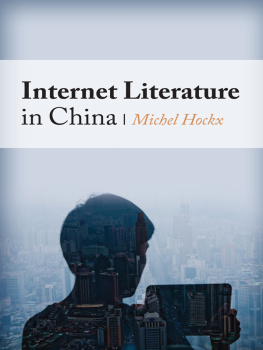

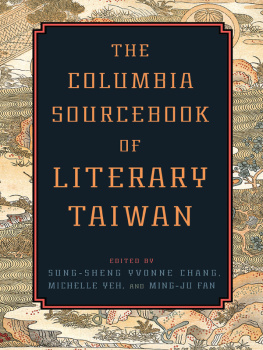

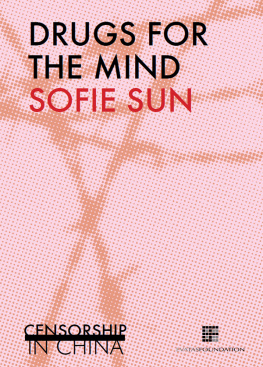
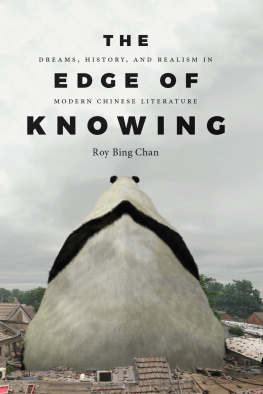
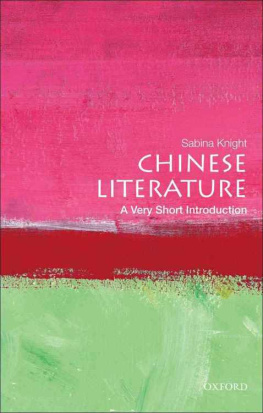

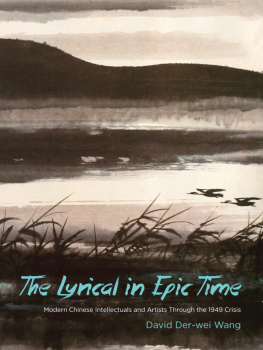
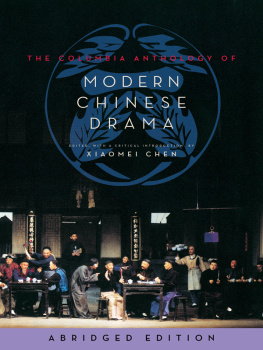
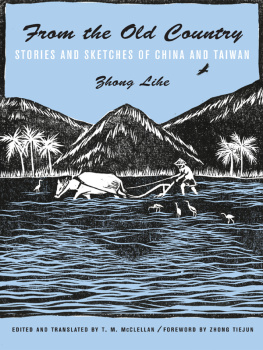

 I STARTED PAYING ATTENTION to Internet literature in China around the turn of the millennium, having noticed during a trip to China that wangluo wenxue was being widely debated and that printed versions of works originally published online were starting to hit the shelves of bookshops in major cities. What interested me especially was that such born-digital works, even if they looked exactly the same as conventional prose or poetry, would still end up in a special section of the bookshops and be identified as Internet literature. The potential emergence of an entirely new genre, possibly even a new literary field, in China fascinated me, and, over the years that followed, I tried to stay informed about what was happening. Around the same time I also began to talk about Chinese Internet literature during classes and lectures. My first opportunity to give a class on the topic came in 2000 when my SOAS colleague Kevin Latham invited me to make a contribution to his Chinese Cinema and Media course. Around the same time, Jie Lu from the University of the Pacific invited me to contribute a piece on Internet literature to a special issue of the Journal of Contemporary China, which she was editing, and in this context she also invited me to visit her university and give a talk on the topic to her students. I am grateful to both Kevin and Jie for encouraging my early interest in this topic.
I STARTED PAYING ATTENTION to Internet literature in China around the turn of the millennium, having noticed during a trip to China that wangluo wenxue was being widely debated and that printed versions of works originally published online were starting to hit the shelves of bookshops in major cities. What interested me especially was that such born-digital works, even if they looked exactly the same as conventional prose or poetry, would still end up in a special section of the bookshops and be identified as Internet literature. The potential emergence of an entirely new genre, possibly even a new literary field, in China fascinated me, and, over the years that followed, I tried to stay informed about what was happening. Around the same time I also began to talk about Chinese Internet literature during classes and lectures. My first opportunity to give a class on the topic came in 2000 when my SOAS colleague Kevin Latham invited me to make a contribution to his Chinese Cinema and Media course. Around the same time, Jie Lu from the University of the Pacific invited me to contribute a piece on Internet literature to a special issue of the Journal of Contemporary China, which she was editing, and in this context she also invited me to visit her university and give a talk on the topic to her students. I am grateful to both Kevin and Jie for encouraging my early interest in this topic.